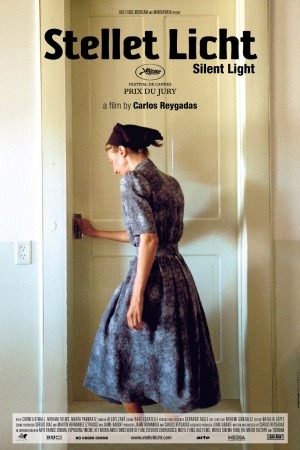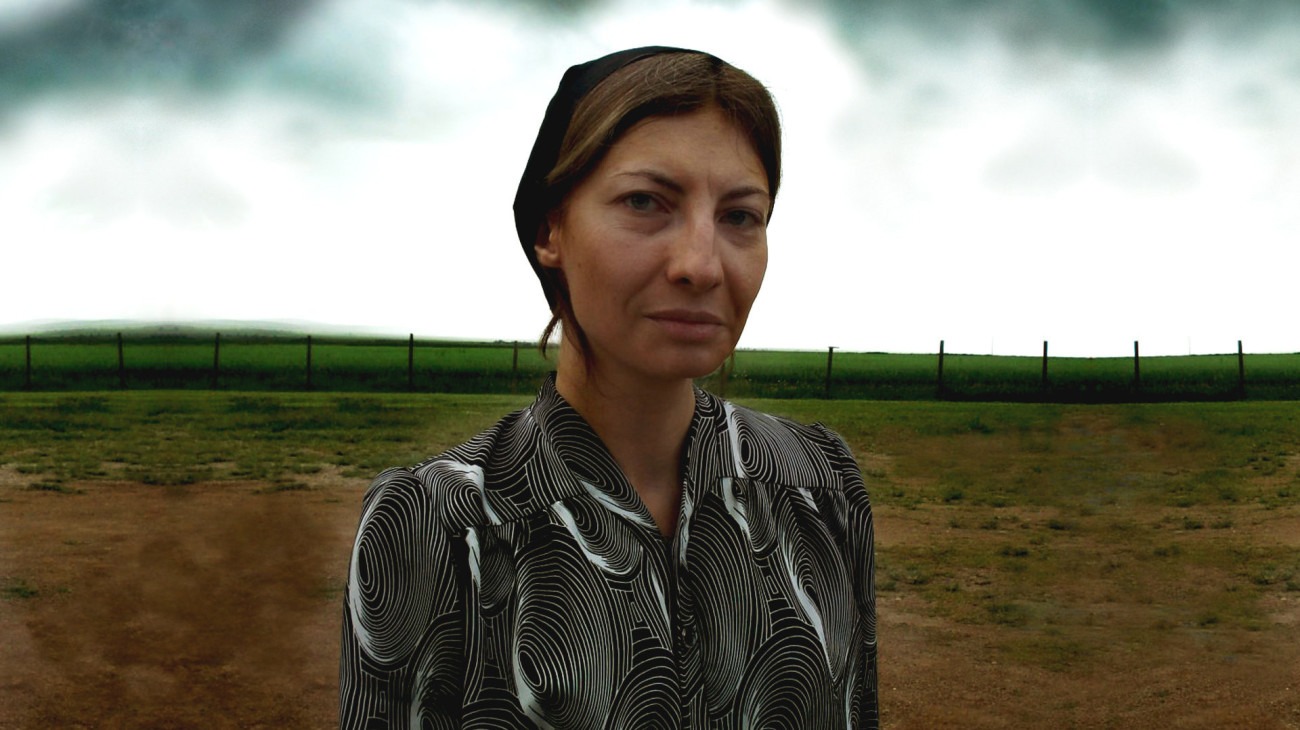
The 43rd Chicago International Film Festival
Carlos Reygadas's Silent Light is a decidedly unconventional motion picture, playing by so few of the rules that govern moviemaking, whether commercial or "art" films, that I feel almost uncomfortable calling it a movie at all. Certainly there are all the usual paradigms about cinematography does this, editing does that, writing does the other thing, that can be brought to bear on the film, but I sort of don't want to.
The weirdness starts at the production history: this is the first film ever shot in Plautdietsch, a language or dialect (there is controversy on this point) spoken by Mennonites in the Americas. The Plautdietsch-speaking cast is comprised almost uniformly of non-professional Mennonites in the first (and presumably final) acting gig. The movie was filmed in Mexico by a Spanish-speaking director, and is the official Mexican submission for the Academy Awards, a situation that would not have been possible except for the newly-revised eligibility rules.
That's all trivia, although some of it is awfully useful trivia (the bit about the Mennonite non-actors in particular). The film itself, though, really does feel like something odd, something deserving of an odd history like that. Not to the degree that "you've never seen anything like it!" but it's out there.
The story is tiny: Johan (Cornelio Wall) is a Mennonite farmer living in northern Mexico with children, a wife, Esther (Miriam Toews), and a mistress, Marianne (Maria Pankratz). He tries unsuccessfully to balance the two women in his life, and he begins to wonder if Marianne is a gift from God or a temptation from Satan.
If that doesn't look like much, that's probably because it really isn't. Yet it's the foundation for a film that runs to almost two and a half hours. Clearly, there's no way that such a story can be stretched out that long right? Yes and no. The thing is, Reygadas doesn't make any particular effort to foreground that story for long stretches at a time, instead focusing on the rhythms of life, favoring the indelibly slow development of story and character through very neutral observations of Johan's world. Not that it's an ethnography, or anything like that: one of the most distinctive aspects of the film is the way that it tosses Mennonite life and philosophy at the audience as though we're supposed to know everything about the society already. Instead, the focus is very much on the domesticity and placidity and comfort of Johan's life as an individual, not as a representative of something greater.
This is all communicated through some of the most action-deficient long takes imaginable (it's so, so tempting to compare this to Tarkovsky, and so, so inappropriate in so, so many ways). Reygadas and his cinematographer, Alexis Zabe trot out a great many empty frames, full of a melancholy beauty, and just let them hang there for minutes at a time, sometimes with something happening that advances the story, sometimes not - for example, the film's incredible opening shot starts on a field of stars and tilts down to the horizon, where the camera holds steady for every bit of four minutes, watching the sun creep over the horizon. These vacant moments aren't meaningless, of course; they are sometimes symbolically laden (the sunrise, obviously) and sometimes they are simply indicators of the film's ecosystem.
Importantly once the story ramps up - once Johan becomes less discreet about his affair - the shots get shorter, the exterior shots grow less prevalent and the interiors more, and the lighting grows less painterly and impressionistic. Implicitly, what's happening is that the laid-back, natural rhythm of things is being disturbed by Johan's actions, made faster and more chaotic as it were.
Still, even as it increases, the pacing of the film is never "movielike." Scenes run into each other essentially randomly: the example so jarring as to be almost comic is when a late-summer day cuts immediately and without context to the middle of winter. Really, it's almost impossible to tell how much the first half of the movie covers; it seems to be early summer through the following spring, but that's just a guess. The film seems to exist outside of time and most of the plot takes place in the spaces between cuts; or at least, significant portions of the plot do, and somehow it is natural that they should. It's not conventional, I said, and I'm sticking by that. Silent Light is a continuum of events and emotions that we drop into, much less than it is a classically described story.
When the end comes, it comes with a healthy dose of magical realism, if not outright fantasy, and despite the fact that the film has heretofore been as sober and realistic as anything, that change doesn't seem particularly jarring, I think because the whole film has seemed so impressionistic to this point. I'm not at all comfortable calling it a religious film, thought it is about the religious, but it certainly a mystic film throughout, it just couches its mysticism in a literally hypnotic slowness. I have no doubt that it's a film that is not to all tastes, for sound aesthetic reasons (I do love a film where I can read all of the bad reviews, think "that's completely right," and still think exactly what I think), but for those on the same wavelength as its deliberate anti-cinematic bent, it achieves something close to transcendence; at any rate, it is clearly something different, if not necessarily "more," than the limits of its art form.
9/10
The weirdness starts at the production history: this is the first film ever shot in Plautdietsch, a language or dialect (there is controversy on this point) spoken by Mennonites in the Americas. The Plautdietsch-speaking cast is comprised almost uniformly of non-professional Mennonites in the first (and presumably final) acting gig. The movie was filmed in Mexico by a Spanish-speaking director, and is the official Mexican submission for the Academy Awards, a situation that would not have been possible except for the newly-revised eligibility rules.
That's all trivia, although some of it is awfully useful trivia (the bit about the Mennonite non-actors in particular). The film itself, though, really does feel like something odd, something deserving of an odd history like that. Not to the degree that "you've never seen anything like it!" but it's out there.
The story is tiny: Johan (Cornelio Wall) is a Mennonite farmer living in northern Mexico with children, a wife, Esther (Miriam Toews), and a mistress, Marianne (Maria Pankratz). He tries unsuccessfully to balance the two women in his life, and he begins to wonder if Marianne is a gift from God or a temptation from Satan.
If that doesn't look like much, that's probably because it really isn't. Yet it's the foundation for a film that runs to almost two and a half hours. Clearly, there's no way that such a story can be stretched out that long right? Yes and no. The thing is, Reygadas doesn't make any particular effort to foreground that story for long stretches at a time, instead focusing on the rhythms of life, favoring the indelibly slow development of story and character through very neutral observations of Johan's world. Not that it's an ethnography, or anything like that: one of the most distinctive aspects of the film is the way that it tosses Mennonite life and philosophy at the audience as though we're supposed to know everything about the society already. Instead, the focus is very much on the domesticity and placidity and comfort of Johan's life as an individual, not as a representative of something greater.
This is all communicated through some of the most action-deficient long takes imaginable (it's so, so tempting to compare this to Tarkovsky, and so, so inappropriate in so, so many ways). Reygadas and his cinematographer, Alexis Zabe trot out a great many empty frames, full of a melancholy beauty, and just let them hang there for minutes at a time, sometimes with something happening that advances the story, sometimes not - for example, the film's incredible opening shot starts on a field of stars and tilts down to the horizon, where the camera holds steady for every bit of four minutes, watching the sun creep over the horizon. These vacant moments aren't meaningless, of course; they are sometimes symbolically laden (the sunrise, obviously) and sometimes they are simply indicators of the film's ecosystem.
Importantly once the story ramps up - once Johan becomes less discreet about his affair - the shots get shorter, the exterior shots grow less prevalent and the interiors more, and the lighting grows less painterly and impressionistic. Implicitly, what's happening is that the laid-back, natural rhythm of things is being disturbed by Johan's actions, made faster and more chaotic as it were.
Still, even as it increases, the pacing of the film is never "movielike." Scenes run into each other essentially randomly: the example so jarring as to be almost comic is when a late-summer day cuts immediately and without context to the middle of winter. Really, it's almost impossible to tell how much the first half of the movie covers; it seems to be early summer through the following spring, but that's just a guess. The film seems to exist outside of time and most of the plot takes place in the spaces between cuts; or at least, significant portions of the plot do, and somehow it is natural that they should. It's not conventional, I said, and I'm sticking by that. Silent Light is a continuum of events and emotions that we drop into, much less than it is a classically described story.
When the end comes, it comes with a healthy dose of magical realism, if not outright fantasy, and despite the fact that the film has heretofore been as sober and realistic as anything, that change doesn't seem particularly jarring, I think because the whole film has seemed so impressionistic to this point. I'm not at all comfortable calling it a religious film, thought it is about the religious, but it certainly a mystic film throughout, it just couches its mysticism in a literally hypnotic slowness. I have no doubt that it's a film that is not to all tastes, for sound aesthetic reasons (I do love a film where I can read all of the bad reviews, think "that's completely right," and still think exactly what I think), but for those on the same wavelength as its deliberate anti-cinematic bent, it achieves something close to transcendence; at any rate, it is clearly something different, if not necessarily "more," than the limits of its art form.
9/10






